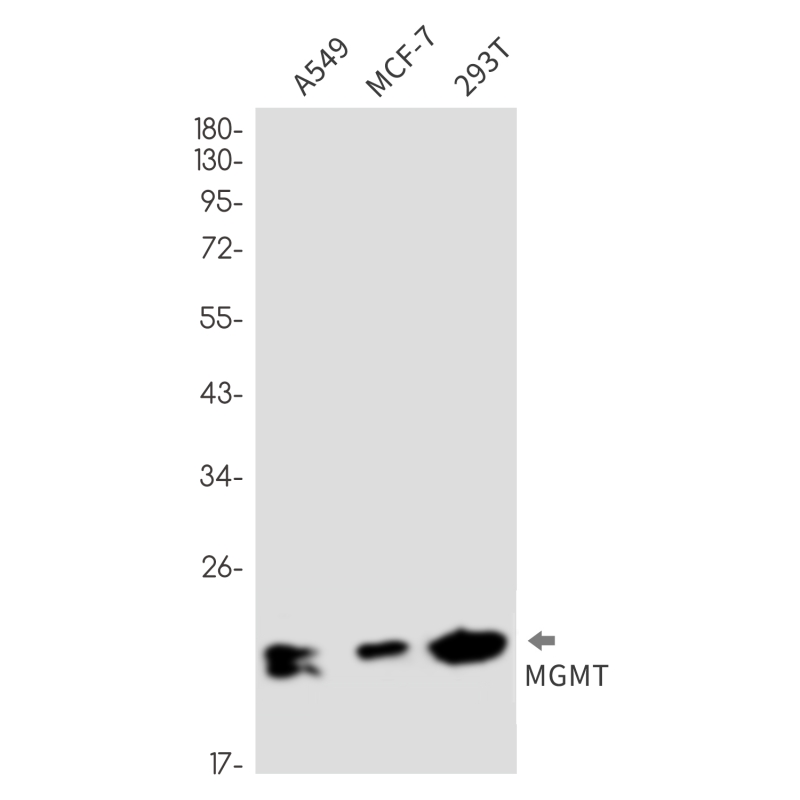
| WB | 1/500-1/1000 | Human,Mouse,Rat |
| IF | 1/20 | Human,Mouse,Rat |
| IHC | 咨询技术 | Human,Mouse,Rat |
| ICC | 技术咨询 | Human,Mouse,Rat |
| FCM | 咨询技术 | Human,Mouse,Rat |
| Elisa | 咨询技术 | Human,Mouse,Rat |
| Aliases | Methylated-DNA--protein-cysteine methyltransferase |
| Entrez GeneID | 4255 |
| WB Predicted band size | Calculated MW: 22 kDa; Observed MW: 22 kDa |
| Host/Isotype | Rabbit IgG |
| Antibody Type | Primary antibody |
| Storage | Store at 4°C short term. Aliquot and store at -20°C long term. Avoid freeze/thaw cycles. |
| Species Reactivity | Human |
| Immunogen | A synthetic peptide of human MGMT |
| Formulation | Purified antibody in TBS with 0.05% sodium azide,0.05%BSA and 50% glycerol. |
+ +
以下是关于MGMT抗体的3篇经典文献及其简要摘要:
---
1. **文献名称**:*MGMT Gene Silencing and Benefit from Temozolomide in Glioblastoma*
**作者**:Hegi, M.E., et al.
**摘要**:该研究分析了胶质母细胞瘤患者中MGMT启动子甲基化状态与替莫唑胺化疗效果的关系,发现MGMT甲基化(通过免疫组化检测蛋白缺失)显著延长患者生存期,为个体化治疗提供依据。
---
2. **文献名称**:*Immunohistochemical Detection of MGMT Protein and Correlation with Methylation Status in Gliomas*
**作者**:Preusser, M., et al.
**摘要**:比较了免疫组化(IHC)与甲基化特异性PCR(MSP)检测MGMT状态的一致性,指出IHC抗体(如克隆MT3.1)在评估MGMT蛋白表达中的局限性,需结合分子检测以提高准确性。
---
3. **文献名称**:*MGMT Testing in Glioblastoma: From Biology to Clinical Decision-making*
**作者**:Weller, M., et al.
**摘要**:综述了MGMT作为生物标志物的临床意义,强调免疫组化抗体在肿瘤组织切片中检测MGMT蛋白表达的标准化挑战,并讨论了其在指导烷化剂化疗中的实际应用。
---
如需更多文献或具体细节,可进一步补充关键词(如特定抗体类型或疾病模型)。
MGMT (O6-methylguanine-DNA methyltransferase) is a DNA repair enzyme that plays a critical role in maintaining genomic integrity. It functions by removing alkyl groups from the O6 position of guanine, a common site damaged by alkylating chemotherapeutic agents such as temozolomide (TMZ) and nitrosoureas. By repairing these lesions, MGMT counteracts the cytotoxic effects of these drugs, making tumor cells with high MGMT activity resistant to chemotherapy. Conversely, epigenetic silencing of the MGMT gene via promoter methylation reduces its expression, impairing DNA repair and increasing tumor sensitivity to alkylating agents.
MGMT promoter methylation status has emerged as a key predictive biomarker in oncology, particularly for glioblastoma (GBM). Patients with MGMT-methylated tumors show significantly better response rates and survival when treated with TMZ. Immunohistochemistry (IHC) using MGMT antibodies is commonly employed to assess protein expression, though its correlation with promoter methylation status remains debated due to post-transcriptional regulation and technical variability. Molecular methods like methylation-specific PCR (MSP) or pyrosequencing are considered more reliable for methylation analysis.
Research continues to explore MGMT's role in other cancers, including colorectal and melanoma, and its interplay with novel therapies like PARP inhibitors. Despite limitations in standardization, MGMT testing remains pivotal in guiding personalized treatment strategies, underscoring its importance in neuro-oncology and precision medicine.
×